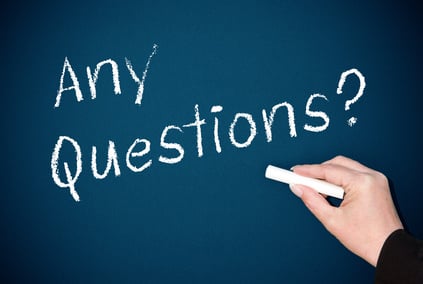 When you're interviewing for a job, you're usually focused on answering the interview questions that the hiring manager asks that you might make a critical mistake. You might forget to ask your own questions.
When you're interviewing for a job, you're usually focused on answering the interview questions that the hiring manager asks that you might make a critical mistake. You might forget to ask your own questions.
I cannot count how many times I have received unfavorable feedback from a hiring manager saying that the candidate didn't ask any questions. When you don't have questions to ask in the interview process, you appear uninterested in the opportunity. Rather than being passionate and excited for a new career opportunity, you appear as if you're only looking for a new job and paycheck.
By asking questions, you are indicating your interest in the position and that you are taking the search seriously. The interview process is not only for a company to decide if you're a good fit for the role, but it is also the time for you to figure out if the role and company are a good fit for you. If you don't have questions, you won't be able to effectively decide if the role is for you or not.
{Related Article: How to Prepare for A Sales Job Interview}
Ask questions that are important to you when considering making a career move. You want to ask about the job, the leadership team, the path for professional growth, what makes a top performer successful, and you want to do this in a tactful manner. For instance, a question that you want to avoid saying, especially early on in the process, is "So what is the salary for this job?"
Here are 10 interview questions you should ask when considering a new sales job.
1. Why is this position open?
This question gives you some insight as to the growth and movement of the company. This will tell you if the person in the role before was promoted and that there is growth in the company, or if this role is a new position and if you'd be the first sales representative to fill it, or it will also provide insight into whether the person before left the company or was let go. Either way you can figure out the importance of the vacant sales role.
2. How long have you been in your position and what brought you to the company?
Again this is a question you can ask to gauge employee growth and retention while also showing interest in the person that is interviewing. This is another way you can keep building rapport while learning more about the company and job. You may be able to draw parallels between you and your interviewer. He or she might even share that they had similar concerns as you or were interested in the opportunity for reasons you may not have thought about.
3. What are some of the challenges your sales representative face with clients and how do they overcome them?
Have you read reviews that there isn't great customer support or there are issues with new product/software implementation? This is the time to address those concerns. This will give you insight to not only the day-to-day operations but provide more of a "big picture" of what the company is trying to accomplish and how they are planning on getting there.
4. How many sales representatives exceed their goal?
If you've come from a work environment where quota size and revenue goals are unrealistic and the companies don't provide the training to help you achieve your goals, then this is a good question to ask. to help. This will give you insight into the company and the success rate of the sales reps.
{Related Article: This Is Why I Didn't Hire You}
5. What are the characteristics of your top sales performers?
This is a great question to ask to draw parallels between yourself and the company's top performers. This will give you some insight into what it takes to be successful in the role as well as giving you an idea what day-to-day operations look like. This question helps answer whether or not you will be a culture fit.
6. What mistakes do new hires typically make?
If you're worried about joining a new company and getting ramped up, this is a good question to ask. This will not only tell you how sales reps succeed, but why they fail in this sales position. It will highlight any pitfalls in the job while giving you insight in how to overcome typical challenges when starting this role.
7. What do you know now about this role that you wish you had known?
This is a great question to ask to keep building rapport with the interviewer, an it helps reveal any questions or concerns you may not have thought about. This enables the hiring manager to share any of their initial concerns when they first joined the company and how they were put to rest once joining the team. They may even talk about how the role has evolved, or that this is the first person to be filling a role like this at the company.
8. What is the typical growth path from this role?
If you're not only looking for your next "sales job" but a company where you can grow professionally and personally this is a great question to ask. If top performers tend to be promoted and have tenure with the company that's a good sign. If the company seems to offer little growth and top performers tend to leave, that could be a red flag for you.
{Related Article: Turn Down Job Offers Not Job Interviews}
9. Do you have any concerns with my ability to do this job?
This is a must ask question in the interview process since it is one of your only chances to address any concerns the hiring manager may have that could prevent you from moving forward in the process. This is an opportunity to overcome any concerns the hiring manager may have. This also shows the interviewer your ability to overcome objections and concerns that prospective buyers may have.
10. What are the next steps in the interview process?
This is another great question to not only determine where you stand in the interview process, but gives you the opportunity to CLOSE the interviewer. Remember you're in sales, you need to know how to close. Asking this question lets the hiring manager know that you are interested in and serious about the job opportunity. This also demonstrates your ability to close which showcases why you are a candidate for this particular role.
Remember, the key to asking questions is to make sure that you write them down and bring them with you to each interview. Write down the answers that you are given to help you with any decision making. One last important point is to make sure that you ask each person that you meet the same questions. As a candidate you are looking for consistency in answers and each person you meet with wants to feel like you have prepared for their time by asking questions. Don't forget to thank each interviewer for their time. Get a business card from each person and send a thank you note to everyone you met with.
Share This Story, Choose Your Platform!
What our happy clients are saying
Contact Us for a Free Consultation
Tell us more about your business and how we can help.











